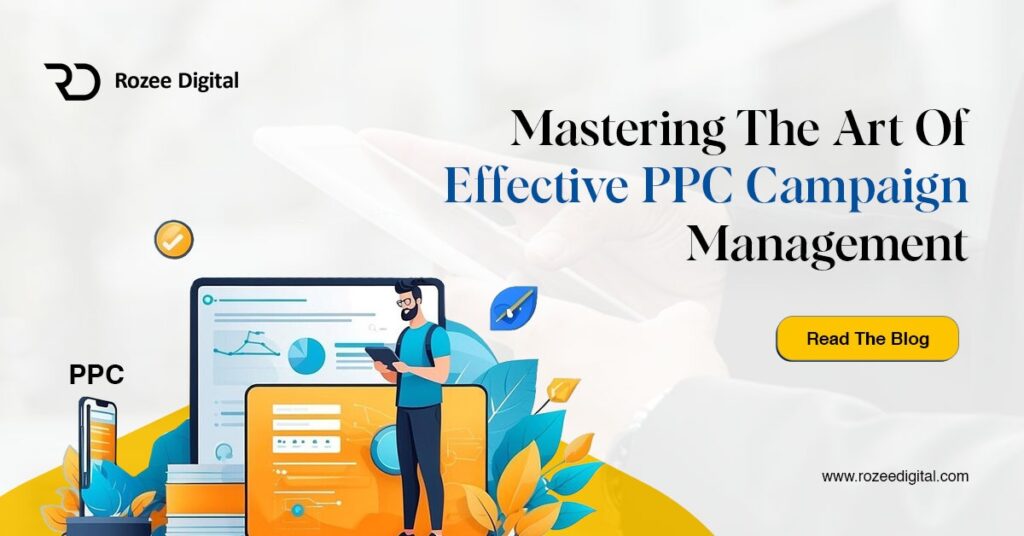PPC advertisements stand out as one of the most favored methods for online advertising. Through crafting ads and employing effective PPC Campaign Management techniques, businesses can ensure their advertisements reach interested audiences. However, achieving success in PPC advertising isn’t always straightforward.
When considering methods to drive traffic to your website, you typically have two primary options: SEO or PPC management. Both avenues serve as effective means of attracting potential customers to your website, and neither holds an inherent superiority over the other.
These approaches have distinct means of reaching the same goals, yet they both provide favorable results when used correctly.
It is projected that advertising spending will rise by 7.61 percent a year until 2026, a sign that companies are realizing the value of PPC tactics. The purpose of this post is to help you optimize the performance of your PPC advertising and maximize the effectiveness of your PPC campaigns.
What Is PPC Campaign Management?
PPC Campaign Management involves overseeing pay-per-click advertising initiatives, where businesses pay a fee each time a user clicks on their ads. Unlike other forms of advertising that charge for a set number of impressions, PPC ads are billed based on bids and the number of clicks received. Advertisers can control their expenditures by setting daily, weekly, and monthly budgets to align with their marketing budgets.
Essentially, advertisers specify the amount they are willing to pay for each click on their ad, along with selecting specific phrases or keywords to associate their website with during user searches. PPC ad campaigns serve as a valuable means of attracting new visitors to websites, bypassing the need for organic traffic acquisition. They enable businesses to target their desired audience by showcasing ads in online spaces where they frequently engage.
As potential customers embark on product research, they are naturally drawn to companies with high Google rankings. Through PPC ads, businesses can secure prominent positions in search results, often appearing above organic listings. Additionally, pay-per-click helps in establishing a company as an authoritative figure within its niche, fostering trust among consumers and enhancing brand recognition.
PPC campaign management involves maximizing the performance of your PPC campaigns by ensuring they are appropriately configured, optimizing them for effectiveness, and making necessary adjustments as required.
Achieving optimal results necessitates ongoing monitoring to assess effectiveness and identify areas for improvement. Running tests to uncover new opportunities and implementing changes accordingly is essential. This approach safeguards against allocating PPC marketing strategies to budgets that fail to deliver the desired return on investment.
Effective PPC campaign management entails ensuring the setup of campaigns is accurate, optimizing them efficiently, and making necessary adjustments as needed. This proactive approach is vital for maximizing the effectiveness and return on investment of PPC advertising endeavors.
Google Ads: Main of PPC Campaigns
Google Ads continues to reign as the leading choice for PPC campaigns owing to Google’s dominance as the world’s largest search engine. Additionally, platforms like Facebook, Instagram, and Bing offer avenues for running PPC campaigns.
Through Google Ads, advertisers can craft ads to feature prominently on Google’s search engine, typically appearing at the top of search results. Upon bidding on specific keywords, ads have the potential to reach individuals conducting relevant searches.
Given Google’s vast advertiser base, competition for keywords can be intense across various industries. Google evaluates bids and ad campaign relevance to determine ad placement, a process encapsulated in the concept of “ad rank.” Ad rank comprises two key metrics:
1. CPC Bid
This denotes your cost-per-click bid, representing the maximum amount you are willing to pay when a user clicks on your link.
In the PPC setup process, there’s a resemblance to an auction, where successful advertisers target prospects based on predetermined advertising rates aligned with their budgets.
2. Quality Score
This encompasses:
- The quality assessment of your landing page
- The relevance of your advertisement
- Your click-through-rate (CTR)
By either increasing your bid or enhancing your quality score, you enhance the likelihood of your ad appearing when users search for your services or products.
Strategies for Effective PPC Campaign Management
1. Set Clear Objectives
Before launching a PPC campaign, establish clear and measurable goals. Whether it’s increasing website traffic, generating leads, or boosting sales, defining specific objectives will guide your campaign strategy and performance evaluation.
2. Budget Allocation
Allocate your budget wisely across different campaigns, ad groups, and keywords based on their performance and potential ROI. Regularly monitor and adjust budget allocations to maximize your campaign’s effectiveness.
3. Continuous Monitoring and Optimization
PPC campaigns require ongoing monitoring and optimization to ensure optimal performance. Regularly review key metrics such as click-through rate (CTR), conversion rate, and cost-per-acquisition (CPA). Identify underperforming elements and make data-driven adjustments to improve results.
4. Ad Testing and Experimentation
Conduct A/B tests to compare different ad variations, including headlines, descriptions, visuals, and CTAs. Analyze the results to identify the most effective ad elements and refine your campaigns accordingly.
5. Quality Score Improvement
Quality Score, a metric used by platforms like Google Ads, directly impacts ad placement and cost-per-click (CPC). Focus on improving Quality Score by optimizing keywords, ad relevance, landing page experience, and click-through rates.
6. Ad Extensions Utilization
Take advantage of ad extensions to enhance your ads with additional information such as site links, callouts, location information, and structured snippets. Utilizing ad extensions can improve ad visibility, CTR, and overall campaign performance.
7. Geo-targeting and Audience Segmentation
How to run a PPC campaign specific to geographic locations and target audiences? Simply tailor your PPC campaigns to specific geographic locations and target audience segments to maximize relevance and effectiveness. Leverage demographic, behavioral, and interest-based targeting options to reach the right audience with the right message.
8. Remarketing Strategies
Implement remarketing campaigns to re-engage users who have previously interacted with your website or shown interest in your products or services. Utilize dynamic remarketing to display personalized ads based on users’ past interactions.
Maximize your brand’s profitability with Rozee Digital, your PPC Ads Agency. Elevate conversions with expert PPC strategies today!
How to Manage Your PPC Campaign
Are you prepared to embark on your PPC campaign management journey? Remember, from campaign setup to execution, understanding PPC tips is key. Certain crucial steps must be executed correctly to ensure the success of your PPC campaign.
1. Selecting the Ideal Keywords
The initial step involves assessing customer demand. It’s evident that if there’s no demand for your service or product, PPC won’t yield results. Therefore, it’s imperative to ascertain a substantial search volume for your offerings.
You can achieve this by utilizing the Google Keyword Planner, which functions akin to a thesaurus. Begin by compiling a list of phrases you believe your potential leads may be searching for, then input them into the tool. Subsequently, the tool will furnish you with additional relevant and similar phrases.
Moreover, the Google Keyword Planner provides valuable insights including:
- The search volume for each keyword
- The level of competitiveness within Google Ads
- The estimated cost-per-click for each keyword
With these insights in mind, it’s essential to address three pivotal questions:
1. What is the search volume for this keyword? Are individuals actively searching for it on Google?
2. Are individuals searching for this keyword likely to purchase your business?
3. Can you afford to invest in using this keyword effectively?
Compile a list of potential keywords that satisfy the aforementioned criteria to facilitate your PPC campaign planning process.
2. Monitor Your Competitors
In most industries, some businesses have already fine-tuned their PPC campaigns, sparing you the effort of trial and error. These competitors have already identified effective landing pages, ads, and keywords tailored to your niche.
You can access this valuable intelligence through a tool like KeywordSpy. This paid tool grants you access to crucial historical advertising data that your competitors prefer to keep confidential. With KeywordSpy, you can conduct searches to analyze how your competitors leverage PPC, allowing you to further research keywords for your campaigns.
Additionally, you can perform searches based on your chosen keywords to identify competitors, scrutinize their ad content, and evaluate their landing pages. However, this method may require more time and effort.
3. Optimize your copy
When delving into PPC campaign management, it’s paramount to craft compelling copy that highlights your unique selling proposition (USP). Your USP serves as the beacon that distinguishes you from competitors and provides potential leads with a compelling reason to choose your business.
This entails zeroing in on your core strengths and discerning what sets you apart from similar businesses. However, it’s equally crucial to effectively convey this message to the searchers.
By meticulously refining your copy, you can:
- Attract qualified leads who opt for your ad over those of competitors.
- Determine unqualified leads who are unlikely to convert, thus safeguarding your ad budget from wasteful clicks.
High-quality copy should clearly convey your identity, underscore what makes you unique, and articulate why someone should click on your ad. Your call to action should be unequivocal and may include enticing offers to prompt users to take the next step.
4. Track Your Conversions
Implementing conversion tracking enables you to gauge the sales generated by your PPC campaign. These metrics provide insights into which ads and keywords are driving customer purchases.
To set up conversion tracking, locate the tracking code within the “Tools and Analysis” section of your Ads account for PPC analysis. Subsequently, integrate this code into your receipt or thank-you page to accurately attribute purchases to your PPC ads. This process is invaluable for evaluating the efficacy of your campaigns and optimizing them accordingly.
Optimizing Your PPC Campaigns
A significant portion of the above-mentioned tasks can be tackled at the start of your campaign. However, PPC campaign management also entails the ongoing process of fine-tuning and optimizing your campaigns as they progress.
This involves eliminating underperforming elements and reallocating resources towards those yielding positive results. Here are some key considerations for effective PPC campaign management:
1. Pruning
Similar to tending a garden involves trimming overgrown and dead branches, pruning your keywords entails removing those that hinder your campaign’s performance. These may include:
- Keywords generating clicks but not conversions
- Keywords with low Quality Scores (typically 3 or lower)
- Keywords resulting in conversions at an unprofitable cost
You can access this information under the “Search terms” subtab in your Ads account. By eliminating ineffective keywords, you can allocate more resources to those driving profitability. Additionally, continuously research and test new keywords to gauge their performance.
2. Bid Optimization
Bid optimization entails determining which keyword bids will generate the most profitable conversions. This involves assessing factors such as:
- Customer lifetime value
- Business objectives
- Conversion metrics (e.g., phone calls, sales, demos)
By analyzing each keyword’s conversion rate and determining the maximum affordable bid, you can optimize bid strategies accordingly. Continuously monitor data to adjust bids and run tests on low-converting or unprofitable keywords, evaluating copy, offers, and landing pages.
3. Campaign Targeting
Effective PPC campaign management also involves strategic campaign targeting, focusing on:
Devices: The effectiveness of your ads varies based on customer device preferences. Mobile users typically have lower conversion rates than desktop users. Segmenting your data by device type is essential to understand performance accurately. Adjust targeting accordingly for optimal campaign profitability.
Geography: PPC campaign management includes geographic targeting, which involves analyzing performance data based on location. With geo-targeting, you can allocate resources efficiently to profitable locations, exclude non-converting ones, and tailor ads for improved conversions.
Time: You should also evaluate the performance of your campaigns based on the day of the week and time of day. Different campaigns are likely to yield better results on specific days and times. By navigating to the “Settings” tab, you can modify your bids according to the day and time, ensuring you prioritize bidding on the most lucrative periods for your campaigns. This feature is particularly beneficial for time-sensitive services. For instance, if you offer meal delivery, it’s unnecessary to invest in ad spend during closed hours when purchases cannot be made.
Want to maximize your conversions with targeted pay-per-click campaigns? We Boost your brand’s profitability – Rozee Digital, Your trusted PPC Ads Agency. Get started today!”
Wrapping up
In conclusion, mastering effective PPC campaign management is crucial for businesses looking to maximize their online advertising efforts. PPC advertisements offer a powerful way to reach targeted audiences and drive traffic to websites. While both SEO and PPC have their merits, PPC provides immediate visibility and can be highly effective when managed correctly.
Key strategies for successful PPC campaign management include selecting the right keywords, monitoring competitors, optimizing ad copy, tracking conversions, and continuously refining campaigns. Geo-targeting, bid optimization, and strategic campaign targeting based on devices, geography, and time also play vital roles in maximizing campaign effectiveness and ROI.
By implementing these strategies and continuously monitoring and optimizing campaigns, businesses can harness the full potential of PPC advertising to achieve their PPC marketing objectives and drive business growth.




